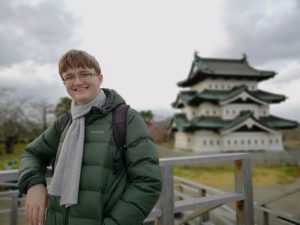Every summer, the Department of Statistics offers scholarships to high-achieving students so they can work with staff on real-world projects. Yongshi Deng, below, is working with communications company Vodafone New Zealand on a project analysing and predicting customer behaviour.

Yongshi, who has a BSc in Mathematics and Statistics and an Honours in Statistics from the University of Auckland, is spending seven weeks working within Vodafone’s Big Data and Analytics team.
Her research focuses on analysing and modelling opt-out behaviour among Vodafone’s fixed line customers – those who have purchased broadband, landline telephone and television services. She is using a combination of data on what customers do when they use these services, network data and information from Vodafone’s call centre.
It’s a big job, Yongshi says, but she is relishing it: “I enjoy this project a lot, as I can put my knowledge I learn from my degrees into practice.” There are plenty of problems to solve: “The major challenge is data cleaning, since big, real-world datasets can be very messy. There are millions of missing values that need to be handled.”
Another challenge is variable selection. “The dataset I am currently working on has more than 120 variables, so this makes dimension reduction indispensable,” Yongshi explains. It’s critical that she chooses a good combination of variables to build models that can generalise well for unseen data. This step, she says, is based not only on statistical tests but also on domain knowledge, which she gets from her colleagues at Vodafone.
Yongshi’s supervisor at Vodafone, Neel Sengupta, says that having students in-house brings benefits to both parties. “They get to see what business data looks like and the sheer scale of it. The benefit for us is that we get to see the advancements coming out of universities that we might not necessarily see in a commercial set-up.”
Yongshi’s supervisor in the Department of Statistics, Ciprian Giurcaneanu, agrees that the biggest benefit to students of such work experience is that ”they get in contact with the real world. This allows them to see how useful in practice are the techniques that they have learned in our department.” They also have to fend for themselves: “The lecturer “who knows everything” is not there, and the students have to find their own answers to their questions.”
Yongshi is originally from Dongguan, China. This year, she plans to pursue a PhD at the University of Auckland, and already has a good idea of the field she wants to research: “I am particularly interested in applying machine learning techniques to solve real-world problems.”
Yongshi says that statistics is a “fantastic subject” that not only helps her explore the world, but keeps her motivated and engaged. She particularly appreciates the R programming skills that she has learned in the Department of Statistics. “The department provides a wide range of statistical courses and R is integrated in most courses, which has equipped me with the skill and knowledge I’ll need for further study.”
- For general information on University of Auckland summer scholarships, click here.



